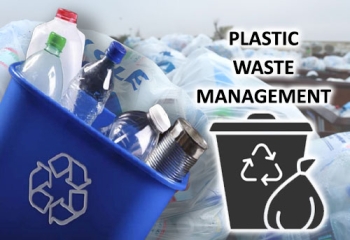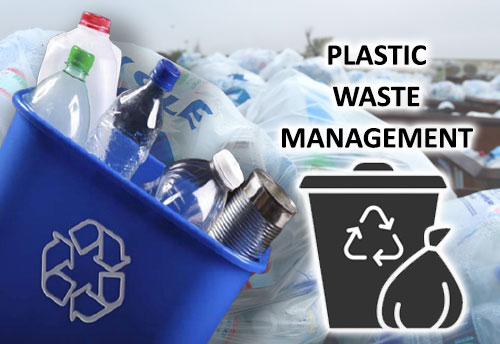
.png) Aarti
Aarti

June 5 this year marks the 50th anniversary of World Environment Day. Observed globally since 1973, this year’s theme #BEATPLASTICPOLLUTION, with focus on solutions to plastic pollution, is quite apt.
For India, which assumed the presidency of the G20 forum on December 1 last year, among others, it is a very special occasion to voice its views and garner support in so far as the environment is concerned. More so because, G20 members account for more than 80 percent of the world’s GDP, 75 percent of global trade and 60 percent of the population of the planet.
As part of the G20 decision-making process, in respect of environment, discussions of the Environment and Climate Sustainability Working Group (ECSWG) shall focus on ‘Promotion of Blue Economy along with Coastal Sustainability’, ‘Restoration of Degraded Lands and Ecosystems’ and ‘Enhancement of Biodiversity’ and ‘Strengthening of Circular Economy’.
Notably, the first and second ECSWG meetings had taken place from 9 to 11 February 2023 and 27-29 March 2023 at Bengaluru and Gandhinagar respectively. Laudably, the G20 member countries have reportedly reaffirmed their commitment towards combating the environment and climate crisis – of course with a renewed sense of urgency. They have also agreed on the pressing need for concerted global efforts and the immediate action required, given the current scenario. The 3rd and 4th ECSWG meetings are scheduled to be held between 21 and 23 May 2023 and 26-27 July 2023 at Mumbai and Chennai respectively.
That plastic pollution has become one of the most pressing environmental issues is disconcerting. Ever since it was discovered in 1907, the global demand for plastics has outpaced all other bulk materials such as steel, aluminium and cement. It is used in packaging, healthcare, mobility/transport, electronics, agriculture, sport and leisure equipment, building/construction and energy.
Nearly 400 million tonnes of plastics is produced globally. Packaging constitutes around one-third of such demand followed by construction and clothing. For instance, plastics are part and parcel of blood transfusion bags, replacement joints, flexible catheters. A host of several other applications rely on plastic like medical equipment, vaccination kits and personal protective equipment – all play a vital part in keeping us healthy. However, the cause for concern is about the plastic waste that remains uncollected. Most of these are single use and low value that are not picked by plastic waste collectors which eventually reach either landfills or streams and rivers, thereby contributing to marine litter.
To manage plastic waste, the Union Government notified the Plastic Waste Management Rules, 2016 on 18 March, 2016 and the Solid Waste Management Rules, 2016 on 8 April, 2016. As plastic waste is part of solid waste, therefore, both the rules apply to managing plastic waste in the country. Under the Plastic Waste Management Rules, 2016, the generators of plastic waste are required to take steps to minimize generation of plastic waste, not to litter the plastic waste, ensure segregated storage of waste at source and hand over segregated waste in accordance with rules. The rules also mandate the responsibilities of local bodies, gram panchayats, waste generators, retailers and street vendors to manage plastic waste.
Most importantly the Plastic Waste Management Rules, 2016 defined Extended Producer's Responsibility (EPR). It cast the responsibility of a manufacturer of plastic carry bags, and multilayered plastic pouches and sachets and the brand owners using such carry bags and multilayered plastic pouches and sachets for the environmentally sound management of the product until the end of its life. EPR is also applicable to both pre-consumer and post-consumer plastic packaging waste. The harsh reality is less than one-fifth plastics are recycled globally, leaving more than 80 per cent of the production to find its way into landfills or oceans. According to some reports, packaging plastics in India constitutes around 43 percent of total plastic demand and around 60 percent of plastic waste collected is recycled.
World over, the plastics industry reportedly has been striving to transform its traditional linear economy (where plastics are typically disposed of at the end of their service life) into a plastics circular economy (where plastics can remain in circulation longer). Briefly put, emerging technologies coupled with improved products design can enable reuse at the end of their life span as also recycling of plastics waste streams that cannot be processed by mechanical recycling.
At the macro level there have been various initiatives by the Government like the Swachh Sagar Surakshit Sagar campaign which was aimed to remove approximately 15,000 tonnes of waste from 75 beaches in 75 days. The Swachh Bharat Mission aimed at eliminating open defecation led to the construction and use of over 100 million toilets in rural India within a span of 7 years. The Ujwala Scheme increased households with LPG connections from 62 percent in 2015 to 99.8 percent in 2021. The Mission LiFE (Lifestyle for Environment) introduced by Prime Minister Narendra Modi at the 2021 United Nations Climate Change Conference, Glasgow on 1 November 2021 aims to nudge individuals and communities to practice a lifestyle that is synchronous with nature and does not harm it. The objective is to mobilise at least one billion Indians and other global citizens to take individual and collective action for protecting and conserving the environment in the period 2022–28. Within India, at least 80 percent of all villages and urban local bodies are aimed to become environment-friendly by 2028.
If reports are to be believed, the total quantity of plastic packaging consumed in India is approximately 6.33 million metric tonnes per annum. We cannot ban plastics altogether because they contribute to healthier and longer lives. But it can be used prudently. According to the United Nations Environment Programme, if 1 out of 8 billion people worldwide adopt environment-friendly behaviours in their daily lives, global carbon emissions could drop up to 20 per cent. At an individual level small steps can go a long way like using a cloth bag instead of a plastic bag while shopping can save up to 375 million tonnes of solid waste from entering the landfill. It’s time to beat the plastic pollution. Our behaviour and attitudes towards plastics merit change as the unabated use of plastics comes with an avoidable environmental cost. Surely, together, we can.